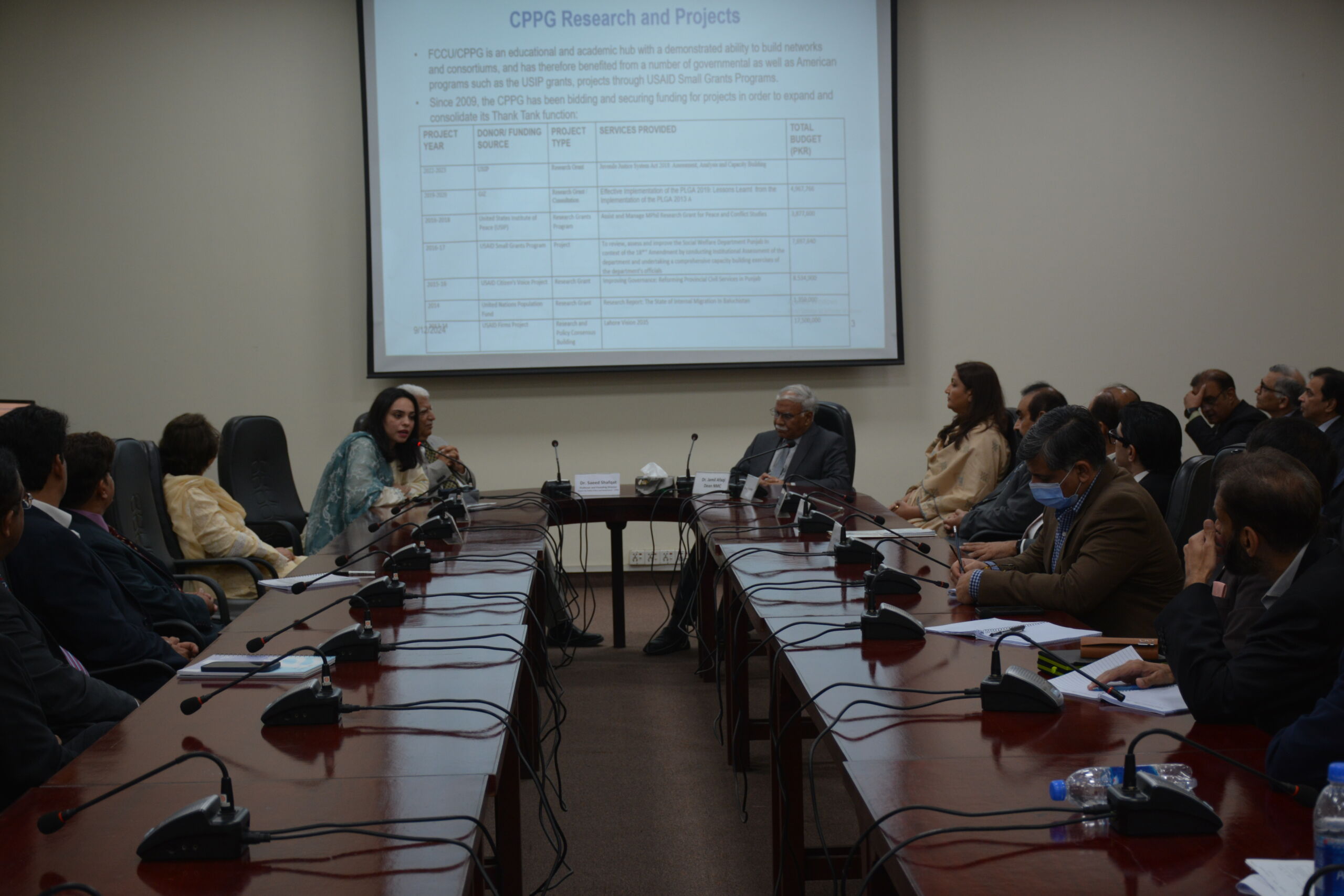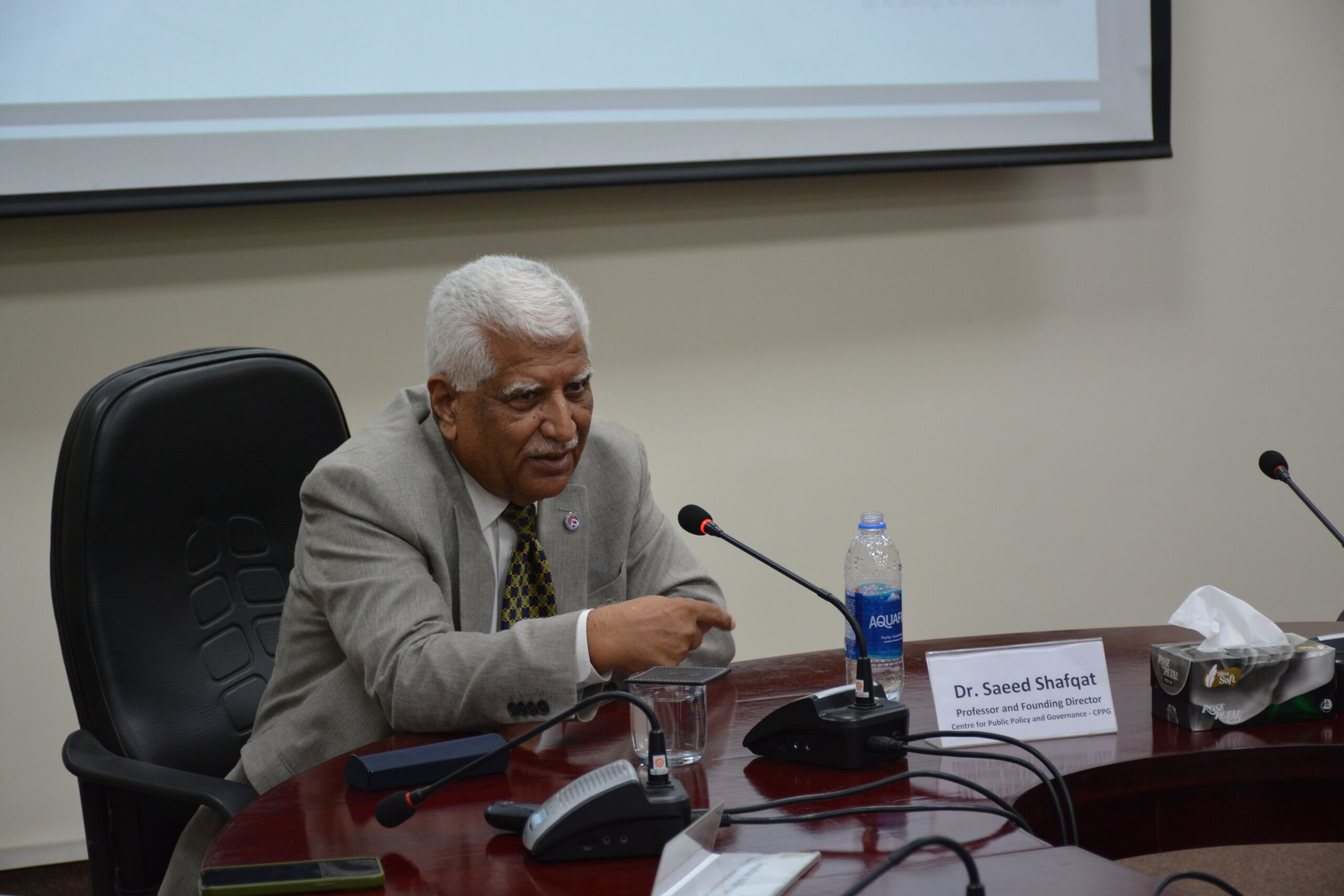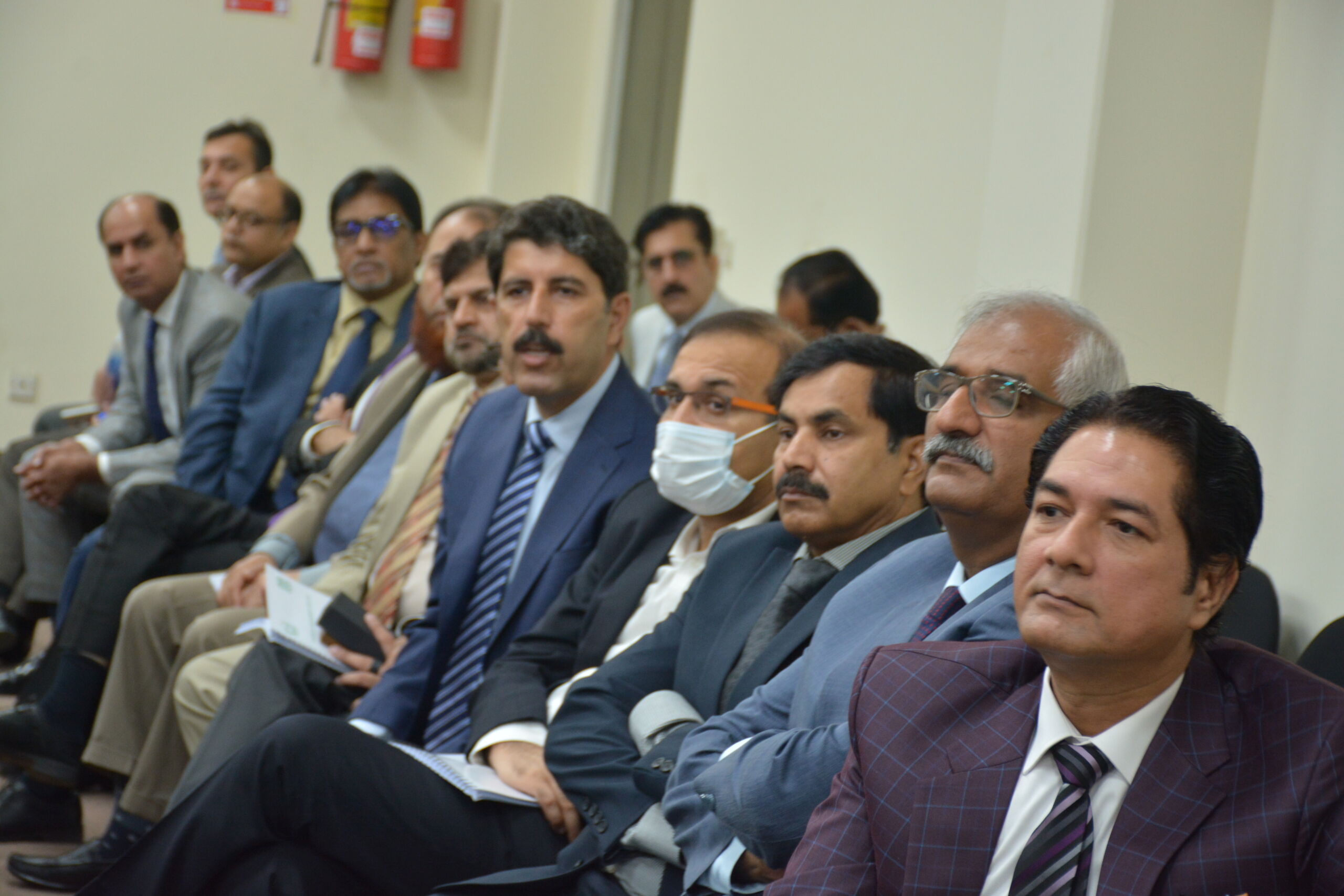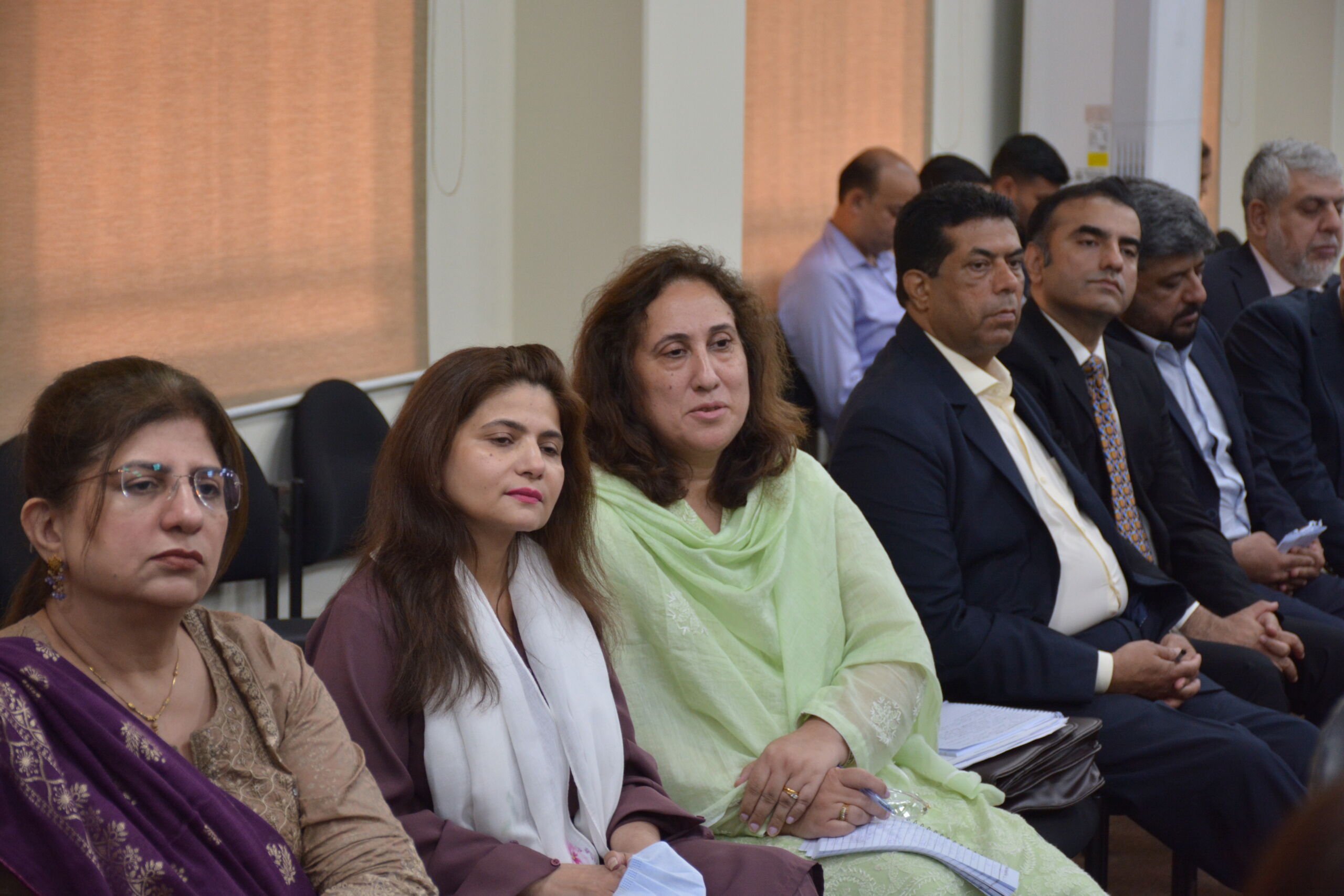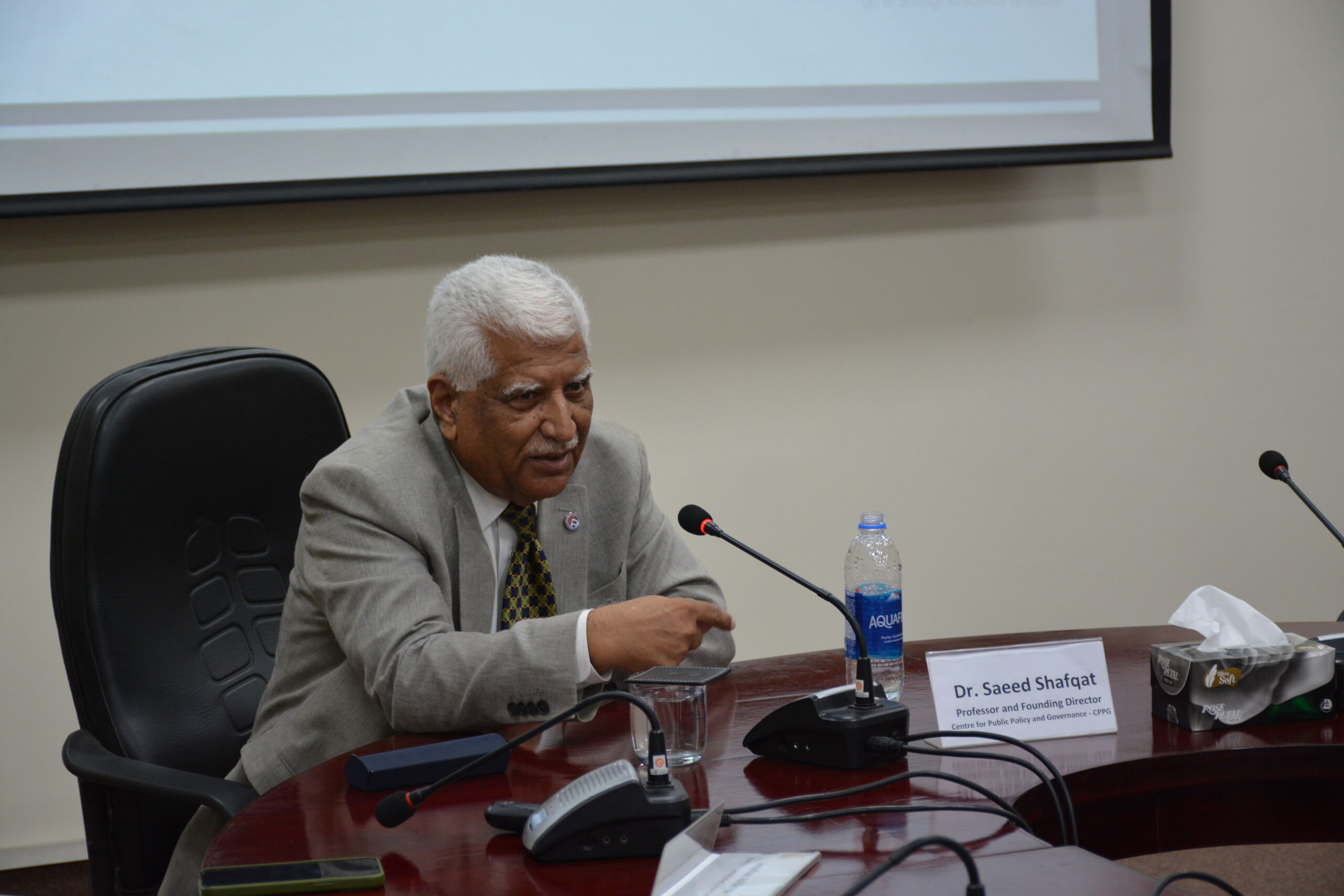
A talk on Public Policy Formulation and Implementation in Pakistan with Dr. Saeed Shafqat
Talk
Past Event
Sep 12, 2024 - 11:00 am |
Sep 12, 2024 - 1:00 pm
CPPG
E-002 CPPG FCCU
Upcoming Event
A delegation of fifty BS-20 officers along with their faculty members from the National Management College – National School of Public Policy (NMC – NSPP) visited the Centre for Public Policy and Governance (CPPG) at Forman Christian College (A Chartered University) for a talk on Public Policy Formulation and Implementation in Pakistan with Dr. Saeed Shafqat, Director CPPG. The session started with a brief introduction of CPPG by Ms. Ayesha Saddiqua. She told the participants about the previous policy projects and grants CPPG had secured as a think tank and policy research and training centre. Before starting his presentation, Dr Shafqat thanked the faculty and attendee officers, and remarked that this is an unprecedented event where the NMC officers have come to attend a cross-campus lecture talk.
Dr. Shafqat started his presentation by giving an overview of principles and individuals that influence modern policy making. Shifting his focus to Pakistan, he began highlighting the issues that plague policy processes in Pakistan. First, he mentioned how the coercive capacity of the state is increasing day by day while the welfare aspects are declining. Second, he also contended that political parties are losing their relevance and politics does not get the legitimacy it deserves. Third, the democratic temperament is largely missing from the national discourse and needs to be restored. Democratic dispensation is a cornerstone for a democratic state. Fourth, he emphasized that the domain of policymaking resides with the executive branch, which is very susceptible to external influences. Lastly, Dr. Shafqat highlighted that the Think-Tanks are not playing their part in influencing meaningful policies and instead, donor agencies have now taken over that role. These donor agencies are not interested in any political reform, which Pakistan needs the most at the moment.
Dr. Shafqat, while focusing on the role of bureaucracy, presented that bureaucracy has access to information that is not available to others which essentially means that it is the bureaucracy that wields the power to present or withhold information, thus dictating the workings and dealings of the state. According to him, today’s civil servants are far more educated than ever, yet they remain underutilized. Bureaucrats, he outlined, are of three types: those using rationality, those using bounded rationality, and those muddling through. He then asked the attendees to take a look at themselves and try to fit themselves into a category.
Dr. Saeed Shafqat emphasized the role of local government as well as states by referring to the issue of COVID-19, he mentioned how the pandemic had a great impact on the world, it led to the reemergence of the role of the state that was somewhat lost during the era of globalization. It has also paved the way for a new wave of local governments. What if another pandemic hits? The local governments shall be best equipped to deal with mitigating the crisis efficiently and effectively. However, when it comes to Pakistan the strategic culture of elites has a great influence on the policy process but at the same time diverging visions of different stakeholders result in oscillations in the policies. Policy needs to be backed by some degree of data. It is hard to eliminate subjectivity since an opinion bias would always be there, but the solutions should always be data-driven. When evidence is limited only then should personal judgment come into play in regards to what is public good.
Towards the end of his presentation, Dr. Saeed Shafqat commented that while the multidisciplinary nature of the policy process can be attributed as a strength it also can be regarded as a weakness at the same time since it makes consensus difficult.
The floor was then opened to questions, which lasted for an hour. Questions related to building trust between institutions and the masses and the elitist nature of the policymakers were raised. Replying to the questions, Dr. Shafqat stated that all institutions want to protect their interests and perks. With no organizing force in place, the whole system is susceptible to collapse. The elite policymakers need to build consensus amongst themselves first. They also need to realize that the age of trickling down power is over and the bottom-up approach needs to be implemented. The distrust of the people stems from the fact that the state is barely doing anything meaningful for the masses. Other than this, there is also a lot of criticism surrounding how the people in power conduct themselves.. To gain trust the state must ensure the formation of strong local governments and should reduce indirect taxation. Individuals representing state institutions should work on their outlook and conduct especially when they are engaged in public dealing. Sometimes individuals become larger than institutions, which can directly affect the legitimacy and credibility of an institution. They need to set an example by upholding civic values and ensuring civic education is imparted to the citizenry as well.
On the question of accountability in policy-making, Dr. Shafqat remarked that bureaucracy is not doing its work and has outsourced its tasks to consultants instead, who are now functioning as conduits between the governments and donor agencies. The bureaucracy needs to recapture its abandoned role and do its job.
Answering a few more questions Dr. Shafqat then turned to Dr. Jamil Afaqi, Dean of NMC-NSSP who thanked Director CPPG for an extensive and engaging session on the complexities of policy formulation in Pakistan. To conclude the session, the Rector of Forman Christian College (A Chartered University), Dr. Johnathan Addleton was asked to share his thoughts. Observing the diversity of the delegation, the Rector remarked that Pakistan is like a mosaic of rich cultures and backgrounds, something that Forman Christian College also celebrates through its diverse student body that it welcomes from all over Pakistan. On the issue of bureaucracy, Dr. Addleton mentioned that it is unfortunate that civil servants are subject to a lot of criticism but their successes disappear overnight, but despite that they should not stop making positive changes in the lives of the communities surrounding them.


